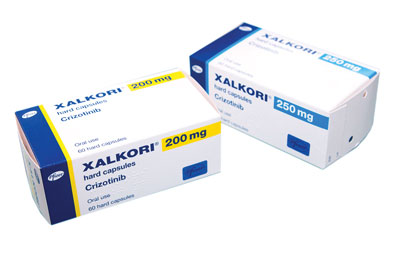Xalkori (crizotinib) vs Krazati (adagrasib)
Xalkori (crizotinib) vs Krazati (adagrasib)
Xalkori (crizotinib) and Krazati (adagrasib) are both targeted therapies used to treat certain types of non-small cell lung cancer (NSCLC) that have specific genetic alterations. Xalkori is approved for ALK-positive and ROS1-positive NSCLC, and it works by inhibiting the activity of these proteins to slow down tumor growth. Krazati, on the other hand, is designed to target KRAS G12C-mutated tumors, a different genetic mutation, and would be suitable for patients whose cancer harbors this specific mutation, offering a new treatment option for this previously difficult-to-target oncogenic driver. When deciding between these medications, it is crucial to have a molecular diagnosis to determine which genetic alterations are present in the tumor, as this will guide the choice of the most appropriate therapy.
Difference between Xalkori and Krazati
| Metric | Xalkori (crizotinib) | Krazati (adagrasib) |
|---|---|---|
| Generic name | Crizotinib | Adagrasib |
| Indications | ALK or ROS1-positive non-small cell lung cancer (NSCLC) | KRAS G12C-mutated non-small cell lung cancer (NSCLC) |
| Mechanism of action | ALK and ROS1 tyrosine kinase inhibitor | KRAS G12C inhibitor |
| Brand names | Xalkori | Krazati |
| Administrative route | Oral | Oral |
| Side effects | Visual disorders, GI disturbances, edema, elevated liver enzymes, and others | GI disturbances, liver enzyme elevation, fatigue, and others |
| Contraindications | Severe hepatic impairment, concurrent use with strong CYP3A inhibitors or inducers | Not fully established; avoid use with strong CYP3A inhibitors or inducers |
| Drug class | Tyrosine kinase inhibitor | KRAS inhibitor |
| Manufacturer | Pfizer | Mirati Therapeutics |
Efficacy
Efficacy of Xalkori (Crizotinib) in Lung Cancer
Xalkori (crizotinib) is an oral medication that has been approved by the U.S. Food and Drug Administration (FDA) for the treatment of non-small cell lung cancer (NSCLC). Specifically, it is indicated for patients whose tumors are anaplastic lymphoma kinase (ALK) positive as determined by an FDA-approved test. Crizotinib is a tyrosine kinase inhibitor that works by blocking the activity of the ALK protein, which can promote the growth of cancer cells in ALK-positive NSCLC patients. Clinical trials have demonstrated that crizotinib is effective in shrinking tumors and slowing the progression of the disease in these patients. The response rate to crizotinib in ALK-positive NSCLC patients has been reported to be significant, with many patients experiencing a delay in disease progression.
Efficacy of Krazati (Adagrasib) in Lung Cancer
Krazati (adagrasib) is a newer medication that targets a specific mutation in the KRAS gene, known as KRAS G12C. This mutation is present in a subset of NSCLC patients and has historically been difficult to target with therapy. Adagrasib is designed to irreversibly and selectively bind to the mutated KRAS G12C protein, thereby inhibiting its function and downstream signaling pathways that contribute to tumor growth and survival. While Krazati is still under clinical investigation, early trial results have shown promise in patients with KRAS G12C-mutated NSCLC, offering a potential new treatment option for this challenging target.
Both Xalkori and Krazati represent a shift towards personalized medicine in the treatment of lung cancer, where therapies are tailored to target specific genetic alterations in a patient's tumor. The efficacy of these drugs highlights the importance of molecular testing in the management of NSCLC, as identifying the presence of ALK rearrangements or KRAS mutations can guide the selection of the most appropriate targeted therapy. As research continues, these medications may become integral components of lung cancer treatment regimens, particularly for those with the corresponding genetic profiles.
It is important to note that while both crizotinib and adagrasib have shown efficacy in their respective patient populations, they are not interchangeable and are used to treat different genetic subtypes of lung cancer. The choice of treatment depends on the molecular characteristics of the tumor, and therefore, it is critical for patients to undergo comprehensive genomic profiling to determine the most effective treatment strategy. Ongoing clinical trials and post-marketing surveillance continue to monitor and evaluate the long-term efficacy and safety of these targeted therapies in lung cancer.
Regulatory Agency Approvals
Xalkori
-
European Medical Agency (EMA), European Union

-
Food and Drug Administration (FDA), USA

-
Health Canada

-
Pharmaceuticals and Medical Devices Agency (PMDA), Japan

-
Therapeutic Goods Administration (TGA), Australia

Krazati
-
European Medical Agency (EMA), European Union

-
Food and Drug Administration (FDA), USA

Access Xalkori or Krazati today
If Xalkori or Krazati are not approved or available in your country (e.g. due to supply issues), you can access them via Everyone.org.
How it works

Make an enquiry
Choose the medicine you want to buy, answer a couple of questions, and upload your prescription to speed things up. We’ll get back to you within 24 hours.


Make an enquiry
Choose the medicine you want to buy, answer a couple of questions, and upload your prescription to speed things up. We’ll get back to you within 24 hours.


Breeze through the paperwork
We'll guide you through the required documents for importing unapproved medicine, ensuring you have all the necessary information.


Get a personalized quote
We’ll prepare a quote for you, including medicine costs and any shipping, administrative, or import fees that may apply.


Receive your medicine
Accept the quote and we’ll handle the rest - sourcing and safely delivering your medicine.

Some text on this page has been automatically generated. Speak to your physician before you start a new treatment or medication.
Let's talk
If you have any questions, call us or send us a message through WhatsApp or email:
Contact us




